A recessed vulva in dogs may only be a cosmetic problem for some dogs. But in some cases it also can contribute to urinary tract infections, vaginitis, and superficial skin infections. Integrative veterinarian Dr. Julie Buzby is here to explain. Discover how to recognize a recessed vulva (i.e. hypoplastic vulva), when surgery (vulvoplasty) may be the optimal treatment, and what you can do to help prevent secondary issues for your dog.
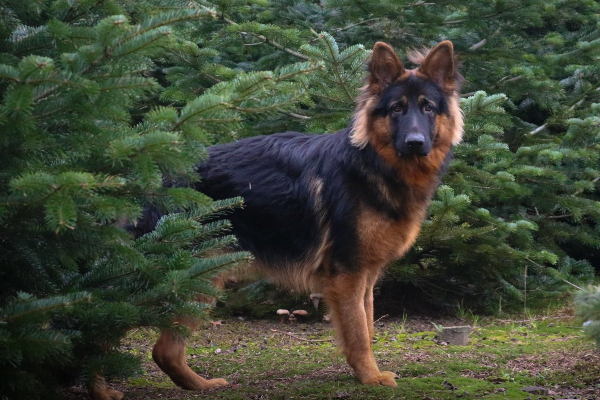
My client, Mrs. Jefferson, adopted a 6-year-old German Shepherd, Nova, and brought her in for an appointment. When I asked how things were going at home, I could see Mrs. Jefferson was stressed. She explained that Nova was house-trained when she was adopted.
However, over the past week, her dog had started having accidents in the house, even if she had just been outside. Mrs. Jefferson also noticed that her dog was licking her hind end more than normal.
Overall Nova appeared to be an extremely healthy and happy-looking girl. But while I was examining her, I did notice the dog had a recessed vulva. My client was quite surprised when I told her this may have been contributing to her dog’s recent accidents in the house.
What is a recessed vulva in dogs?
A recessed vulva is a common problem in female dogs—especially those who are overweight. Also known as a hypoplastic vulva, hooded vulva, or juvenile vulva, it can affect any dog breed. However, it tends to be more common in medium to giant breeds. Also, there may be a genetic component.
What causes a recessed vulva in dogs?
A recessed vulva in dogs occurs when the conformation of the vulva is abnormal. More specifically, a recessed vulva is one that is tucked up further between the dog’s hind legs and/or buried by the skin folds that surround the vulva. This is in contrast to a normal dog where the vulva is fairly distinct when looking at the dog from behind, especially if the dog has short hair.
Other than appearing different visually, a hooded vulva in dogs may or may not cause any issues. In fact, most dog parents do not even know that their dog has a recessed or juvenile vulva until a veterinarian discovers it during a physical examination. Sometimes it is an incidental finding. But in other cases, the recessed vulva can cause other problems that may prompt a vet visit.
Before we go any further into the specifics of recessed vulvas in dogs, I want to run through some relevant anatomy to ensure everyone is on the same page.
The word “vulva” denotes the cone-shaped haired skin that sits between a female dog’s hind legs. Inside the vulva is the opening of the vagina. Plus, the external urethral opening lies on the floor of the inside of the vulva. The vulva is the common exit for products from the urinary tract (urine) and the reproductive tract (bloody discharge or puppies).
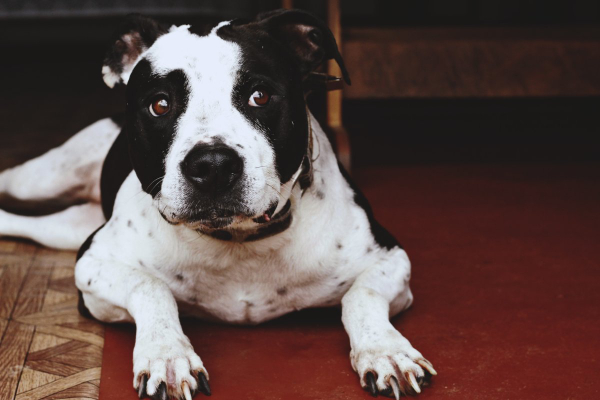
What are the signs of a recessed vulva?
To understand the signs of a recessed vulva, first we need some basic anatomy of the vulva. This can help predict various conditions that may occur because of a recessed vulva.
The biggest issue is that the folds of skin around the vulva can trap urine, debris, and bacteria in the vulva and skin folds around it. As a result, a recessed vulva can lead to skin problems, vaginitis, and urinary tract infections (UTIs) in dogs. Each of these conditions has slightly different symptoms.
Inflamed skin
Inflammatory skin disease tends to be the most common symptom in only mildly affected dogs. This might show up as red, irritated skin which results in scratching and excessive licking of the area.
Skin infections
As inflammation progresses, it may develop into a skin infection (i.e. perivulvar dermatitis). This is especially likely to happen in dogs who already have allergies or skin disease, but can occur in any dog.
These skin infections are very similar to those that dogs can develop in other places, like their ears (i.e. otitis in dogs), armpits, or belly. Due to the excessive skin folds, the vulva is a moist, warm environment that is ideal for bacterial and yeast growth. One or both of those microbes can cause a skin infection.
Unfortunately, this issue tends to snowball. This is because scratching and licking breaks down the skin’s natural barrier, which can lead to further infection and inflammation. This intensifies the itchiness, which leads to more licking and scratching, which only continues to worsen the moist dermatitis.
Vaginitis
As bacteria continue to live on the surface of the dog’s vulva, they can eventually migrate up into the vagina, causing vaginitis (i.e. inflammation of the vagina). Signs of vaginitis include:
- Excessive licking of the vulva
- Staining/color change of hair around the vulva
- Scooting on the floor
- Foul odor
Urinary tract infections
The infection can also progress to a female dog’s urinary tract since the opening of the urethra is located in the vulva. If this happens, the resulting urinary tract infection can cause signs such as:
- Urinary incontinence in dogs
- Inappropriate urination
- Excessive urination
- Straining to urinate
- Blood in the urine
- A change in urine smell or color
These symptoms may give you a starting point. But as with any problem or disease, the clinical signs will vary with every dog. If you suspect that your dog may have a recessed vulva or a problem secondary to it, please consult your veterinarian.
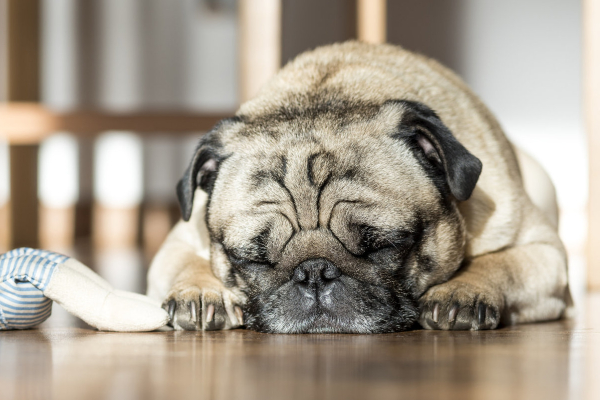
How is a recessed vulva diagnosed?
During a physical exam, your vet will evaluate the conformation of your dog’s vulva. Then he or she can decide whether or not your dog has a recessed vulva. No further diagnostics are needed to diagnose a hooded vulva in dogs.
However, your vet may recommend a variety of additional diagnostics if he or she suspects the recessed vulva may be causing secondary problems.
In order to diagnose skin infections, your veterinarian may use a skin cytology or a skin culture.
For a cytology, the vet will collect cells and debris from the surface of the skin. Then he or she will examine the collected material under a microscope to look for bacteria or yeast. If an infection is present, a culture and sensitivity test may be needed to guide antibiotic selection.
If your vet suspects your dog has a UTI, he or she may start with a urinalysis. This test will look for red blood cells, white blood cells, and bacteria in the urine. A urine culture and sensitivity test can help with choosing the appropriate antibiotic.
Additionally, your vet may suggest an X-ray to look for bladder stones, an ultrasound to look for bladder cancer in dogs, or bloodwork to assess your dog’s overall health.
What is the treatment for a recessed vulva?
Once the vet diagnoses your dog with a recessed vulva, he or she will discuss what—if anything—should be done about it.
If the hooded vulva is an incidental finding on the physical exam and the dog is asymptomatic, the plan might simply involve watching for signs of skin infection, vaginitis, or urinary tract infections.
If the dog has one of these secondary problems at the time the vet diagnoses the recessed vulva, then the vet will recommend a treatment plan specific to that problem. This may include oral antibiotics to treat a skin or urinary tract infection. Treatment may also include special medicated shampoos, mousses, sprays, or wipes if your dog has a skin infection.
For mild cases, a hooded vulva may be improved with weight loss. Fatty tissue in the perineum (the area between the vulva and anus) can cause deeper skin folds around the vulva. Losing weight may help to minimize the appearance and clinical signs of a recessed vulva in some dogs.
In a dog with a severely recessed vulva that is causing secondary issues, surgery is usually the most recommended treatment option. This surgery is called an episioplasty or a vulvoplasty surgery.
Vulvoplasty: Surgery for dogs with a recessed vulva
Think about vulvoplasty in dogs as medically necessary plastic surgery. In this procedure, the veterinarian removes the extra skin around the vulva in a crescent moon shape. Suturing the incision back together tightens the remaining skin, which pulls the vulva up and out.
To see a vulvoplasty dog before and after surgery, check out the photos below of one of my colleague’s patients.
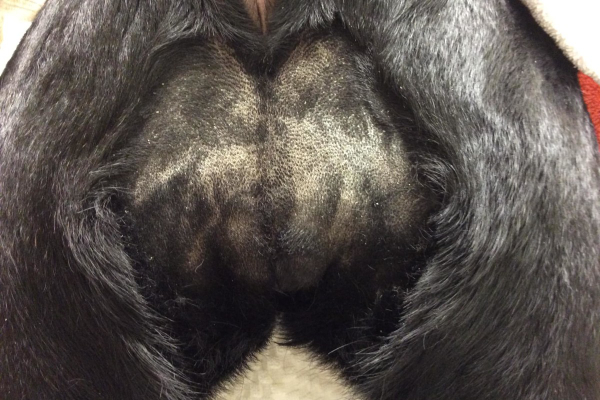
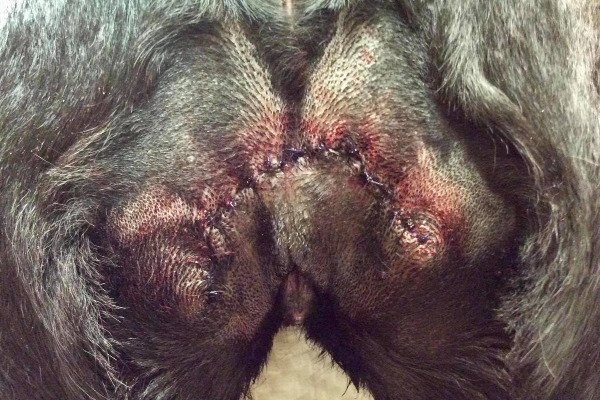
Dog vulvoplasty aftercare
If your pup has been diagnosed with a hooded vulva and surgery is planned, you may be wondering what post-op care looks like. How painful is vulvoplasty for dogs? How long before she can go back to normal activity?
After canine vulvoplasty surgery, the recovery time is usually about 10 to 14 days. During this time, it is important to follow your veterinarian’s directions. One important step is administering the pain medications and anti-inflammatories as directed so your dog can heal comfortably.
Although it may look gruesome in the photo above, vulvoplasty in dogs is not a particularly painful procedure. The veterinarian performing the surgery is only cutting skin and fatty tissue, so they don’t need to disturb any muscle layers. While I certainly send home all my vulvoplasty dogs with post-op pain meds, I don’t consider this procedure more painful than, say, a spay.
For dog parents, a very important post-op care consideration is keeping the incision clean and dry during the healing period. This means the dog should not have baths, go swimming, or lick the incision.
Many dogs are itchy and licking this area before surgery due to skin infections and inflammation; stitches only make them more prone to licking! The safest way to protect the incision is for the dog to wear an E-collar (i.e. cone).
Also, it is very important to keep your dog calm. If she is too playful after surgery, this may pull on the sutures and irritate the incision. When this happens, the incision can open up and heal inappropriately.
Dog vulvoplasty success rate
The good news is that for many dogs, if they heal properly, a vulvoplasty is curative. A study published in the Journal of the American Animal Hospital Association showed that 82% of dog parents indicated the results of a vulvoplasty were at least satisfactory.
In the sample population (which was admittedly small with only 34 dogs), UTIs, vaginitis, and skin infections all decreased significantly after the vulvoplasty. However, urinary incontinence, while reduced after surgery, did remain more of a concern than the other problems.
Dog vulvoplasty cost
Canine vulvoplasty surgery generally costs anywhere from $700-$3,000. The wide range in price is due to many variables. These include the severity of the recessed vulva, the size of the dog, and whether the surgery is performed by a general practitioner or a board-certified surgeon.
Although recessed vulva surgery costs money, keep in mind that continually treating secondary infections is costly too. Over several years of continued infections, treatments may even end up costing more than the surgery. Plus, these infections cause your dear dog discomfort. This can cost you and your dog some good days. When considering all these factors, surgery for a recessed vulva may be the right decision for some dogs.
Are there ways to prevent issues with a hooded vulva in dogs?
As explained above, surgery can reduce secondary problems in dogs with significantly recessed vulvas. However, there are some other steps you can take to manage a recessed vulva if your dog has a milder case. They include:
- Keeping the vulva clean and dry.
- Wiping your dog’s vulva with medicated wipes or baby wipes after she goes outside.
- Taking your dog to the vet whenever you notice excessive licking or scooting. Your vet can manage mild irritation of the vulva before it turns into an infection.
- Managing underlying allergies with allergy medicine for dogs and other strategies suggested by your vet.
- Using medicated shampoo for bathing your dog.
- Managing your dog’s weight. (I recommend starting by finding your dog’s body condition score and talking to your vet about how to help a dog lose weight.)
- Talking to your vet about the right time to spay your dog. Hooded vulvas are more common in spayed dogs. But this must be weighed with the risks of developing other conditions such as mammary cancer and pyometra that can be reduced or prevented by spaying early.
- Avoiding breeding your dog. While a dog with a recessed vulva can have puppies just like a normal dog, recessed vulva may have a genetic component. This means there is a chance the female puppies would have a recessed vulva, too.
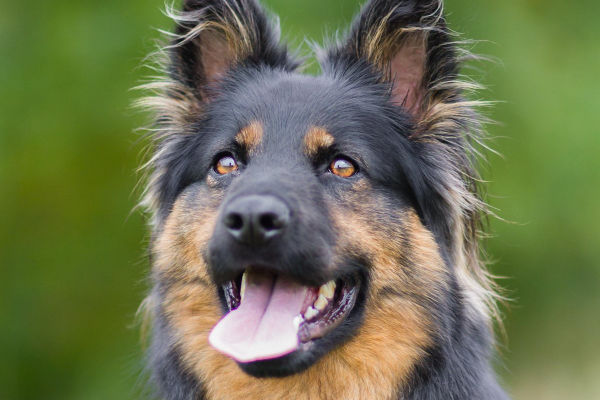
Back to Nova
Now that we finished discussing much of the same information as I did during my appointment with Mrs. Jefferson, let’s go back to Nova. As it turns out, Nova had a UTI, which is why she was having so many accidents in the house. I prescribed some antibiotics to treat the UTI and recommended my client use medicated wipes around Nova’s vulva.
Even though my client was very diligent about keeping Nova clean, her dog had a few more episodes of recurring UTIs and mild skin infections. This lead me to recommend pursuing a vulvoplasty surgery for Nova. Thankfully, Mrs. Jefferson had purchased pet insurance for her dog upon adoption, and she was able to move forward with surgery.
Nova had her vulvoplasty and recovered very well. Since then, my client said that her dog is much happier because she is not dealing with an irritated vulva and recurrent UTIs.
Work with your veterinarian
If your dog has a recessed vulva, work closely with your veterinarian to figure out the best plan. Maybe you just need to keep an eye on your dog for symptoms. Or perhaps the vet will want you to use some of the management steps we just discussed. Maybe a vulvoplasty is the best option.
Regardless of which category your dog falls into, you can feel confident that together you and your veterinarian can keep a recessed vulva from interfering with your dog’s health and comfort.
Does your dog have a recessed vulva?
Which management strategies have worked best? Please comment below.
Editor’s note: This post was originally published July 7, 2022. It has been updated to include more information on vulvoplasty surgery.


Hello, thank you for addressing this issue. We have an 11yr old who also has Addison’s Disease alongside her recessed vulva. Our Vet recommended surgery if we had on going issues, which luckily we haven’t. This last year though, the excessive licking and discoloration has been a problem. She is about 20 pounds overweight, so she can’t get to the area to lick without a lot of squirming around and we usually don’t let her lick for very long. I’m worried that it is now vaginitis, but I don’t think any issues with a UTI since she has zero incontinence issues or foul smells, blood in urine. The skin does look to be a bit raw, so we used an antibiotic cream mixed with hydrocortisone and cleaned it with chlorhexidine wipes. What is the best solution for vaginitis alongside a humid climate? Could we keep Vaseline on it after a bath or is that trapping the moisture?
Thanks for your help, greatly appreciated.
Hi Robyne,
I am sorry your senior girl is having these ongoing issues with her recessed vulva. It sounds like you are doing all you can, and I understand how frustrating it can be when dealing with a chronic medical condition. I would not use Vaseline as it is very important to keep the area dry. It is possible the antibiotic cream may be adding too much moisture to the skin as well. Sometimes medicated wipes work best, and chlorhexidine is great because it has a drying effect too. I strongly recommend a follow up visit with your vet. You really need to know if this is truly vaginitis (infection/inflammation inside the vulva) or just a skin infection on the outer surface. Oral antibiotics may be needed to initially get things under control and then you can continue at home treatments for maintenance. Hoping for clear answers and an easy solution. Wishing you both all the best!
Hello,
My girl Lola has a recessed vulva. I’ve been managing to treat her mild skin fold issues at home but sometimes need the Chlorhexidine wipes to clear things.
Are these the best antibacterial/antifungal wipes or is there another option? (I saw in other replies you mention medicated wipes). Im worried about antibacterial resistance.
I am already wiping and drying her after every pee and find trimming the hair around the vulva helps with airflow.
Would you suggest weekly shampoos or should the wipes be enough?
Hi Basia,
I am sorry Lola is living with this difficult condition. It sounds like you have a good routine in place and are doing well with managing at home. I think the chlorhexidine is just fine, but it can sometimes over dry the skin. For this condition I am not sure that would be a negative side effect. It wouldn’t hurt if you wanted to try a medicated wipe instead. Some dogs need a weekly shampoo to keep things maintained. If you aren’t already using shampoo every week, I wouldn’t start unless you are seeing breakthrough issues with the wipes. Lola is lucky to have you taking such good care of her. Wishing you all the best and keep up the good work!
Hi Dr. Buzby!
My 8 month old Vizsla has a recessed vulva. I’m planning on letting her go through 2-4 heat cycles before spay. She’s had one occurrence of vaginitis ( though I suspected UTI, urinalysis showed elevated white blood cells but no visible bacteria). Antibiotics seemed to resolve it and she immediately mastered potty training. Does a recessed vulva put intact pups at greater risk of pyometra? I’m pretty vigilant, but want to know if I should be extra vigilant. Thank you!
Hi Jessica,
I think your plan to give your girl some time to see if this issue can resolve itself is wise. This is such a great question! Honestly, I am not sure. I have never seen any information or studies that mention a recessed vulva as a contributing factor to pyometra, but that doesn’t mean it isn’t possible. I will pass this on to our blog team and see if they can come up with any new information that I am unaware of. Thank you for bringing up this important topic. Wishing you and your sweet girl all the best!
Thank you so much!! I’m definitely curious 🙂
Hello! My little female American Bully has a recessed vulva. We lost her go through a heat cycle before spay, but vulva is still partially hooded at 2 years old. She recently had an accident broke her canine tooth and needed emergency dental surgery and did not do well under anesthesia 🙁 it was traumatic we almost lost her so I do not want to put her under anesthesia again for the vulva surgery but that seems to be the route my vet suggests. I’ve been using unscented baby wipe to clean her after potty and added a good probiotic, but she’s recently been scooting so I know it’s bothering her. No discharge or odor, but looks a little gross when I pull back to clean the area surrounding her vulva. Should I try cleaning her with anti microbial wipes? Maybe use a yeast/antifungal cream? Any help appreciated!
Hi Brittyn,
I understand your concern for your pup and think it is great you are searching for ways to help her. There are several companies that make medicated wipes to use on dogs’ skin to control yeast and bacterial build up in facial folds or wrinkles. These may offer the benefits you are looking for. I would not recommend using a cream on this area, especially if it was not a product specifically designed for use in dogs. Also, if your girl is scooting on the floor, before assuming it is due to her vulva, I would strongly encourage you to have your vet check her anal glands. When these glands become full it is very common for dogs to scoot to try and express them and relieve the pressure. Hoping you can find the best way to maintain your pup’s health and hygiene. Take care and keep up the good work!
I adopted my puppy, Toast, a month ago. She was spayed at the shelter when she was about 2 months old. After lots of reading and research, I am pretty sure she has a recessed vulva. I have read that it is recommended to let a puppy go through their first heat cycle and that often corrects it, but Toast will not have a heat cycle since the shelter spayed her so early. I understand why the shelter spays dogs, but I can’t help but be frustrated that they did it so early to her. Is there now no chance that her recessed vulva will correct itself? Should I consider surgery? I am very concerned and lost on what to do.
Hi Paige,
I understand your concern for your puppy and think it is good you are searching for information. This situation may still correct itself a bit just with normal growth and development even in the absence of a heat cycle. Your first step is to have your puppy evaluated by a vet to determine if she does in fact have a recessed vulva. If so, then your vet can continue to monitor things as your puppy grows and give you tips on how to manage her at home. If corrective surgery is needed, your vet will let you know and decide when it is best to move forward with the procedure. Hoping this will not be an issue and praying for a positive outcome for your little girl.
My dog had vulvaplasty on Thursday May 9 and is on pain meds and gabapentin as well as trazadone. She has had daily accidents in the house even while going outside also. Is this normal or because of the meds? She also is on Proin which she takes 1/2 tablet twice a day and started taking it approximately 1 year ago
Hi Diana,
I understand your concern for your pup with these changes to her urination habits after surgery. Her medications may be contributing to these issues, but it is always best to rule out medical causes first. I strongly recommend you contact your vet. They may want to ensure there is no sign of a UTI or other surgical complications. Hoping things will resolve quickly and wishing your girl all the best for a full recovery.
Our 5 year old female Shishon had a vulvoplasty done when she was about
1-1/2 years old. She’ started out having UTI’s at a young age and that has turned into chronic UTI’s that we cannot clear with any antibiotics the vet has given her. She’s had 2 bladder surgeries to remove stones. Our vet put her on a special canned dog food specifically for urinary care. We were told that she shouldn’t have issues if she’s on this food, but she’s still having chronic UTI’s and has been on antibiotics for about 4 months now and nothing is cleaning it.
I’m wondering if we are doing something wrong. We wipe her vulva off before she comes in the house after going potty. Could we be causing bacteria going into the urethra by doing this?
Hi Barb,
I am sorry your pup has endured so many urinary tract issues over the past few years. It sounds like you are doing everything you can to keep her happy and healthy. I would not think your routine of wiping her after potty breaks would cause a problem. In fact, that is sometimes what is recommended in cases like this to prevent bacteria from entering the urethra! Without examining your dog, myself, it is hard to make specific recommendations. But it sounds like there may need to be some more in-depth investigation. Has your girl ever had an abdominal ultrasound preformed? Also, this might be a good time to schedule a consultation with a specialist. Hoping you can find the answers you need to ensure your girl stays on the right track. Feel free to leave an update as things progress.
I have a dog who has dealt with recessed vulva her whole life. I have kept her clean and it was not too much of an issue. Vets never talked about a possible surgery but now I wish I had known about that when she was younger. During COVID she kept getting bladder infections and I would drop her off they would do a UA and send her home with antibiotics. After about a year doing this I asked if someone could take a closer look at her vulva and see if this was a factor. They did and agreed it probably was and she should have surgery. I scheduled surgery but asked for a closer inspection under anesthesia because I had noticed blood drops even though the UAs never showed blood in the urine. They discovered a small mass in her vagina and biopsied it and aborted the vulvioplasty surgery and the recommendation was “hospice” care. Well fast forward shes been on low dose chemo for a year and they still don’t want to do the surgery. She feels good but has had several bladder infections even though I do my best to clean her a few times a day. Her vulva has gotten larger from the tumor so the hood is tighter and its harder for her to get all the urine out when she pees. She feels great otherwise playful and good appetite etc. Shes obviously uncomfortable peeing though and it kills me to watch but peeing is a short part of her life and the rest is all good so we continue on. I just wish there is something I could do to open up that area a bit for her since surgery is not recommended. Id do the surgery in a heartbeat though even though she might not be around that much longer. Do you have any suggestions for some kind of device that she could wear while peeing?
Dear Lydia,
I am so sorry your girl is facing this difficult situation. It sounds like you are doing everything you can to maintain her quality of life. Unfortunately, there are no devices for this sort of thing, and I don’t know of any other helpful advice to offer. Try to make the most of the time you are gifted and fill each day with joy and happiness. Wishing you clarity and strength as you navigate this tough path. Bless you and your sweet girl.
I have a lab mix puppy. We took her for her 3rd round of shots today and was told she had a recessed vulva. They said we should let her come in heat at least once and that might possibly fix the problem. I haven’t read anything on this and was wondering if that was something we should consider? I really want to have her fixed BEFORE she comes in heat, but do t want to run the risk of future health issues.
Hi Sandra,
Yes, this is what I also recommend for my own patients. During the first heat cycle, the surge of hormones tends to cause the vulva to swell slightly. This swelling is usually permanent and can sometimes be just enough to reduce the recession so that corrective surgery is no longer needed. I understand your concern with enduring the mess and stress associated with having a dog in heat. But this could be a small price to pay to avoid surgical costs or a lifetime of medical issues.
My female Corgi is 12 1/2 and has had 3 UTI’s in 18 months and my vet recommends a vulvoplasty. She is about 8lbs. overweight and we have managed to reduce her weight by 3 lbs. in 3 weeks. How serious is this surgery for an aging dog.
Hi Marie,
I am sorry your senior girl is having recurring issues with urinary tract infections. Without playing a personal role in your dog’s medical care it is hard to say for sure what the impact would be on her health with or without the surgery. I will say that chronic UTI’s have the potential to lead to kidney infections and kidney dysfunction. This can be devastating for a dog of any age. I recommend you discuss your concerns with your vet and make sure you understand all your options. You need to feel comfortable and confident with any choice you make for your sweet girl.
In 2003, I had a GSP puppy who was diagnosed with both pelvic bladder and a hooded vulva. From the time I brought her home at 12 weeks, she had recurrent UTIs. After three UTIs, at the age of 6 months she was final able to safely take Baytril for her infections, and never had another UTI in her 12 years of life. However, at that point my vet said it was a good idea to see if we could identify a congenital issue for the UTIs. He said if we couldn’t figure out to keep her infection-free, the recurrent infections could cause early incontinence.
We started with X-rays and they immediately identified that she had pelvic bladder, her bladder sitting within the pelvic area and this greatly diminished its capacity.
Twenty years ago, the surgery that is now done for hooded vulvas was not performed except at vet schools, so it was not an option. She was spayed and they sent her home with the sad news that she’d probably be incontinent by two.
Well! I decided to manage to prevent or delay that! I installed a doggy door and let her come and go whenever she needed. She peed small amounts constantly, but never had another accident in the house. And I started giving her 500mg of chewable vitamin C twice a day to see if I couldn’t stave off infections.
Long story short, whatever it was, she never became incontinent or had another UTI, and lived a long happy life.
I have since read many Facebook posts in my GSP pages about UTIs and hooded vulvas, and now see most are told by their vets to let them have one or two heats before spaying, because that will often resolve a hooded vulva. But surgery is now a common solution, which was not an option back in 2003.
Hi Lynn,
Thanks for sharing your girl’s story! I’m so glad you found some solutions with worked for her and that she never got another UTI or became incontinent. It is always exciting when a dog defies the predictions and goes on to have an amazing life.
I have a 9-year-old Chinook named Amber with an inverted vulva. She is doing fine now – recent blood work was normal – BUN and creatine – but a few months ago we almost lost her to a kidney issue. We wipe that area after she is outside. She is on a NF diet which has chicken as its major source of protein. She is itching and has lost some hair in places. A thyroid test was normal. Should we continue her on the NF diet?
Hi Robyn,
I understand your concerns and think you should definitely discuss them with your vet. Without examining your dog, myself, I am not sure if it is ok to discontinue the NF diet or if Amber will need to stay on it indefinitely. While itching and hair loss can be signs of allergies, these issues can also be symptoms of MANY different problems. I would not assume the root of the problem is a food allergy to chicken until your vet has had a chance to rule out other more common issues.
Took my 12week old German Shepard Mix to the vet. She has a recessed vulva. Can’t afford a lifetime of infections or surgery. Should I put her down or find someone to take on this medical condition?
Hi Angela,
I understand your concern for your puppy and think it is good you are reaching out for advice. I definitely would not consider euthanasia an option for this condition. In very young puppies, this problem will sometimes correct itself after they go through a heat cycle or two. The effects of the reproductive hormones cause the vulva to swell and plump a bit. In some cases, the swelling can reduce enough of the recession to correct the issue. It is perfectly fine to rehome your puppy if that seems like it would be best. But you may want to give her a few months to mature and see how things turn out. Hoping for the best and wishing you luck for a happy future.
My dog, Tootsie Roll has a recessed vulva.: it’s been like this since she was a puppy.
She’s now 8 years old.
Our vet gave me a prescription for medicated pads. I use them to clean the deep folds around her vulva. She’s having a hard time right now. I think that she has both a bacterial and yeast disease
Hi Joan,
I am sorry your girl is having issues due to a recessed vulva. The medicated pads are great for hygiene and prevention of infection. If you suspect your pup has a current infection that the pads are not treating, I highly recommend you contact your vet and discuss these concerns. Tootsie Roll may need a course of oral antibiotics or other treatment to resolve the infection and then you can resume your normal regimen of daily cleaning with the pads. This might be a good time to discuss the possibility of corrective surgery with your vet. I hope you can find the information you need to help your sweet girl feel her best.